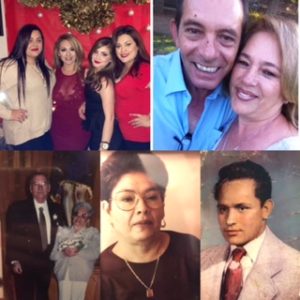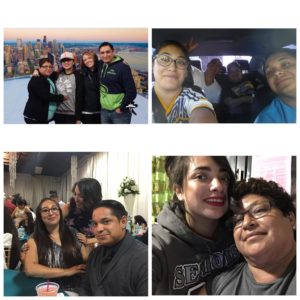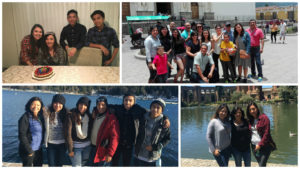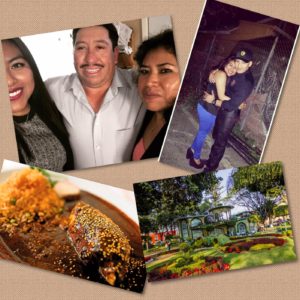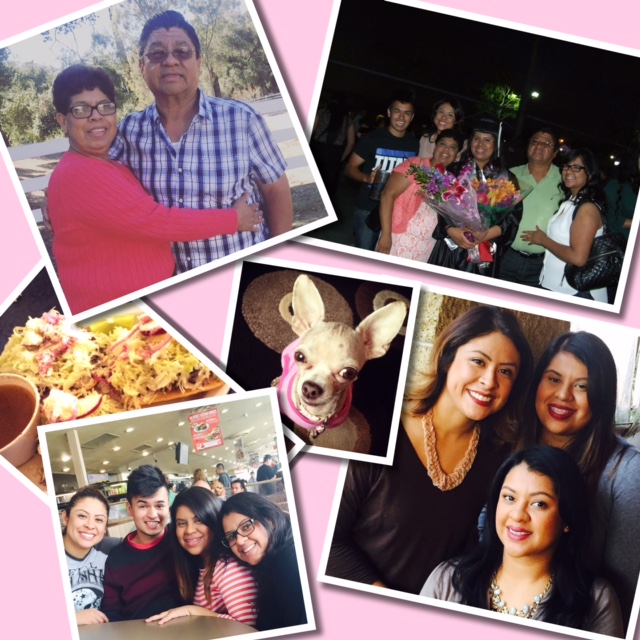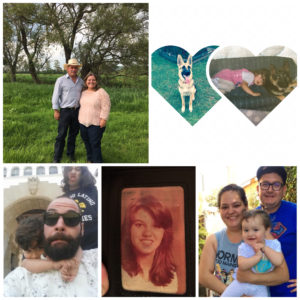
The story begins between the years of 1980 and 1981 with a picture of my mother. My father and my mother’s uncle Sope had worked together for the same trash company. Sope had a picture of my mom and my dad said he would give him five dollars for it but Sope responded with “No, cómo crees.” The conversation about the picture ended there and one day during their lunch Sope goes up to my dad and says “I’ll sell you the picture” I should mention Sope loved to smoke but he did not have a single dollar that day and needed his cigarettes, and so my father said “Okay” and he finally got his picture. About a year or two later after selling the picture Sope was to get married and wanted my mother to come out in it, my grandfather agreed, however, she could not come out with the boyfriend that she was dating at the time. Sope said not to worry that he knew of someone that could come out in it. Three days before the wedding the wedding party met and rehearsed for the big day and my mother walked in and saw my father and thought “Him! I’m going to marry him” that following night my mother met with her boyfriend and told him that she was breaking up with him because the guy that she was coming out with in the wedding is extremely good looking and nice and she wants to see if anything can happen between them. And the rest after that night turns into spending thirty-five years together. In my collage there is a recent picture of my parents in Mexico where every summer and any vacation time is spent.
A year after they were married their first born comes along, a boy Rafael Jr. or Ralph as we like to call him. Three years after their first born comes their second child, a girl Paola or Polly as we like to call her and then nine years after being told they could no longer have children here I come as their third child with no nickname just Mayra. About a year after I was born, a dog named Lady comes along and grows with us for the next eighteen years. Within the collage I have placed a picture of Lady whom I grew up with and was definitely part of the family as she got disciplined, loved, and joked with just as much as my siblings and I did. Next to the picture of Lady and I is a picture of our puppy now her name is Peaches. My sister and I see Peaches more as for the next generation; meaning my nephews and niece may possibly create similar responsibilities and memories as we did with Lady.
When I think back to my childhood, various memories begin to float around beginning with the different family vacations, like the picture of my parents mentioned above, at Disneyland, going to the snow, to weeks on the beach or pool and more. I also think of Saturday mornings when my mom would be baking, my dad showing my brother how to cut the yard with Lady running around, my sister cleaning the bathroom and me floating around to help whoever needed me at the moment. My two nephews, Julian and Oliver are also show in the picture both resembling what my each person in this family has taught them to be themselves, have fun and to love. Recently, my brother and their mother separated and although it has been difficult on my brother it has been extremely difficult on my nephews with the change and having to understand that mommy and daddy don’t love each other anymore. This picture of them means a lot because when it was taken it was during the first family trip without her and not once did they show sadness of the situation but had fun and enjoyed the trip. My niece, Elia, is also in the collage with her parents my sister and her husband on her first birthday this past June and this day was a celebration for us all because she was premature baby who stayed in the NICU for three days and had the possibility of being born a stillborn.
At a glance within the family many could possibly say there had been gender roles in our family and as I got older I started to believe it too. In our childhood my sister and I were taught to clean the house, learn to cook, iron, and basically how to care of the household and then I had noticed my brother was always taught the hands on stuff for outside like: the yard work, anything that had to do with machinery, how to build and to provide. But, then in one of the many arguments that had occurred I mentioned this to my mom and she responded with they did not have us in gender roles because they taught all of us the same things. My brother was taught how to cook, how to clean and iron just before I had been big enough to really understand. When my sister would get bored she was outside learning to cut the yard and doing different building activities with my dad. As for me I would just watch certain things that I wasn’t interested in or I had already known how to do, I just never paid attention because I was too busy complaining that the other sibling did not have to do it. She said what they taught us wasn’t the exact same way as to how they taught the other but the lesson sure was taught because “they are not going to be eternal and we have to know how to take care of ourselves” (Rosa Murillo, every time we ask her to do it).
Within the readings that we have done from the semester I strongly believe that El Plan de Aztlán relates to my family because throughout the ups and downs that have occurred in the many accidents that could have killed my father, the arguments between siblings, with parents or significant other, or separations, financial reasons, etc. we have stayed as one family that sticks up for the other. Within El Plan there are written organization roles which most would been seen within my family, for example, unity, education, cultural and self -defense. My parents and especially my siblings have always told me to stick up for myself to never let anyone walk over me and whether I’m in the right or wrong they have defended me many times when someone would try to verbally attack me. We don’t leave anybody behind and El Plan is a written bondage for the Chicano people and I believe that my family has an unwritten bondage that not many families are lucky to have. I also believe the poems by Marcela Christine Lucero-Trujillo can relate to my family because she speaks on machismo in the first poem and in the second she speaks on assimilation and what Chicanos are told and the total opposite that happens. These poems relate to what my parents raised us on and has become even a bigger topic discussed as we get older to always love ourselves, be ourselves, never try change anyone, to accept and never forget our culture and how beautiful it is. Accepting ourselves ties into the podcast of “Mala Mala: More than a Trans’ Fairytale” because as hard as something “nontraditional” can be for my family they accept and encourage who we are because trying to be someone else can sometimes lead to harm because of how uncomfortable it is. In the podcast they talk about being you and that nobody else’s opinion about you matters.
The one person I have yet to mention that is in my collage is my brother in law, Chuy, his family are our neighbors in Mexico and because I have an uncle who lives by himself Chuy’s family helps look after him. Chuy has been part of my family longer than I have but it was not until three years ago that it was official and when he was able to come over to the U.S. He’s helped mold what our family is today as he shares his family values and keeps us connected with our culture when he tells us stories. The Murillo bunch is far from perfect and is constantly overcoming different obstacles but we also experience wonderful blessings. To think it all began with a picture, which is in the middle of the collage, it’s pretty crazy but if you ask my dad where that five dollar picture is he’d say it’s in his wallet right on top of the many pictures of his grandchildren and children.


